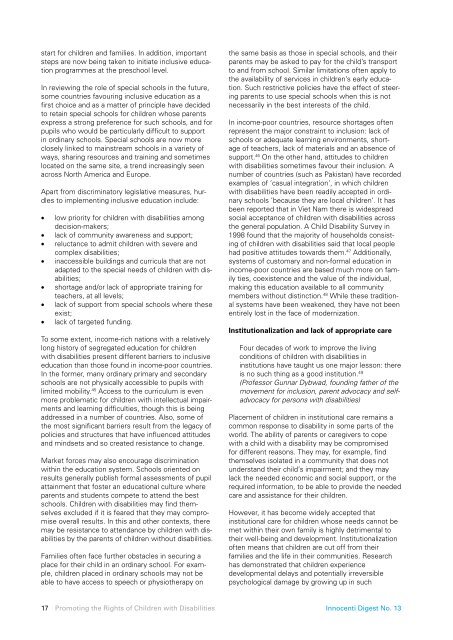Promoting the Rights of Children with Disabilities, UNICEF
Promoting the Rights of Children with Disabilities, UNICEF
Promoting the Rights of Children with Disabilities, UNICEF
- No tags were found...
Create successful ePaper yourself
Turn your PDF publications into a flip-book with our unique Google optimized e-Paper software.
start for children and families. In addition, importantsteps are now being taken to initiate inclusive educationprogrammes at <strong>the</strong> preschool level.In reviewing <strong>the</strong> role <strong>of</strong> special schools in <strong>the</strong> future,some countries favouring inclusive education as afirst choice and as a matter <strong>of</strong> principle have decidedto retain special schools for children whose parentsexpress a strong preference for such schools, and forpupils who would be particularly difficult to supportin ordinary schools. Special schools are now moreclosely linked to mainstream schools in a variety <strong>of</strong>ways, sharing resources and training and sometimeslocated on <strong>the</strong> same site, a trend increasingly seenacross North America and Europe.Apart from discriminatory legislative measures, hurdlesto implementing inclusive education include:• low priority for children <strong>with</strong> disabilities amongdecision-makers;• lack <strong>of</strong> community awareness and support;• reluctance to admit children <strong>with</strong> severe andcomplex disabilities;• inaccessible buildings and curricula that are notadapted to <strong>the</strong> special needs <strong>of</strong> children <strong>with</strong> disabilities;• shortage and/or lack <strong>of</strong> appropriate training forteachers, at all levels;• lack <strong>of</strong> support from special schools where <strong>the</strong>seexist;• lack <strong>of</strong> targeted funding.To some extent, income-rich nations <strong>with</strong> a relativelylong history <strong>of</strong> segregated education for children<strong>with</strong> disabilities present different barriers to inclusiveeducation than those found in income-poor countries.In <strong>the</strong> former, many ordinary primary and secondaryschools are not physically accessible to pupils <strong>with</strong>limited mobility. 45 Access to <strong>the</strong> curriculum is evenmore problematic for children <strong>with</strong> intellectual impairmentsand learning difficulties, though this is beingaddressed in a number <strong>of</strong> countries. Also, some <strong>of</strong><strong>the</strong> most significant barriers result from <strong>the</strong> legacy <strong>of</strong>policies and structures that have influenced attitudesand mindsets and so created resistance to change.Market forces may also encourage discrimination<strong>with</strong>in <strong>the</strong> education system. Schools oriented onresults generally publish formal assessments <strong>of</strong> pupilattainment that foster an educational culture whereparents and students compete to attend <strong>the</strong> bestschools. <strong>Children</strong> <strong>with</strong> disabilities may find <strong>the</strong>mselvesexcluded if it is feared that <strong>the</strong>y may compromiseoverall results. In this and o<strong>the</strong>r contexts, <strong>the</strong>remay be resistance to attendance by children <strong>with</strong> disabilitiesby <strong>the</strong> parents <strong>of</strong> children <strong>with</strong>out disabilities.Families <strong>of</strong>ten face fur<strong>the</strong>r obstacles in securing aplace for <strong>the</strong>ir child in an ordinary school. For example,children placed in ordinary schools may not beable to have access to speech or physio<strong>the</strong>rapy on<strong>the</strong> same basis as those in special schools, and <strong>the</strong>irparents may be asked to pay for <strong>the</strong> child’s transportto and from school. Similar limitations <strong>of</strong>ten apply to<strong>the</strong> availability <strong>of</strong> services in children’s early education.Such restrictive policies have <strong>the</strong> effect <strong>of</strong> steeringparents to use special schools when this is notnecessarily in <strong>the</strong> best interests <strong>of</strong> <strong>the</strong> child.In income-poor countries, resource shortages <strong>of</strong>tenrepresent <strong>the</strong> major constraint to inclusion: lack <strong>of</strong>schools or adequate learning environments, shortage<strong>of</strong> teachers, lack <strong>of</strong> materials and an absence <strong>of</strong>support. 46 On <strong>the</strong> o<strong>the</strong>r hand, attitudes to children<strong>with</strong> disabilities sometimes favour <strong>the</strong>ir inclusion. Anumber <strong>of</strong> countries (such as Pakistan) have recordedexamples <strong>of</strong> ’casual integration’, in which children<strong>with</strong> disabilities have been readily accepted in ordinaryschools ’because <strong>the</strong>y are local children’. It hasbeen reported that in Viet Nam <strong>the</strong>re is widespreadsocial acceptance <strong>of</strong> children <strong>with</strong> disabilities across<strong>the</strong> general population. A Child Disability Survey in1998 found that <strong>the</strong> majority <strong>of</strong> households consisting<strong>of</strong> children <strong>with</strong> disabilities said that local peoplehad positive attitudes towards <strong>the</strong>m. 47 Additionally,systems <strong>of</strong> customary and non-formal education inincome-poor countries are based much more on familyties, coexistence and <strong>the</strong> value <strong>of</strong> <strong>the</strong> individual,making this education available to all communitymembers <strong>with</strong>out distinction. 48 While <strong>the</strong>se traditionalsystems have been weakened, <strong>the</strong>y have not beenentirely lost in <strong>the</strong> face <strong>of</strong> modernization.Institutionalization and lack <strong>of</strong> appropriate careFour decades <strong>of</strong> work to improve <strong>the</strong> livingconditions <strong>of</strong> children <strong>with</strong> disabilities ininstitutions have taught us one major lesson: <strong>the</strong>reis no such thing as a good institution. 49(Pr<strong>of</strong>essor Gunnar Dybwad, founding fa<strong>the</strong>r <strong>of</strong> <strong>the</strong>movement for inclusion, parent advocacy and selfadvocacyfor persons <strong>with</strong> disabilities)Placement <strong>of</strong> children in institutional care remains acommon response to disability in some parts <strong>of</strong> <strong>the</strong>world. The ability <strong>of</strong> parents or caregivers to cope<strong>with</strong> a child <strong>with</strong> a disability may be compromisedfor different reasons. They may, for example, find<strong>the</strong>mselves isolated in a community that does notunderstand <strong>the</strong>ir child’s impairment; and <strong>the</strong>y maylack <strong>the</strong> needed economic and social support, or <strong>the</strong>required information, to be able to provide <strong>the</strong> neededcare and assistance for <strong>the</strong>ir children.However, it has become widely accepted thatinstitutional care for children whose needs cannot bemet <strong>with</strong>in <strong>the</strong>ir own family is highly detrimental to<strong>the</strong>ir well-being and development. Institutionalization<strong>of</strong>ten means that children are cut <strong>of</strong>f from <strong>the</strong>irfamilies and <strong>the</strong> life in <strong>the</strong>ir communities. Researchhas demonstrated that children experiencedevelopmental delays and potentially irreversiblepsychological damage by growing up in such17 <strong>Promoting</strong> <strong>the</strong> <strong>Rights</strong> <strong>of</strong> <strong>Children</strong> <strong>with</strong> <strong>Disabilities</strong> Innocenti Digest No. 13
















